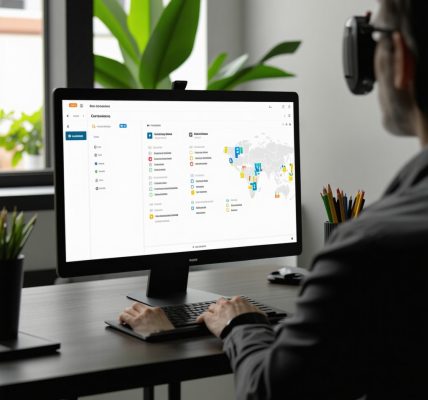Unlocking the Power of GMB Citations: Your Gateway to Local Trust
In the fiercely competitive landscape of local SEO, mastering Google My Business (GMB) citation management is more than a technical task—it’s a strategic art that builds trust and authority within your community. Citations, the mentions of your business name, address, and phone number (NAP) across the web, serve as digital endorsements that Google uses to validate your business’s legitimacy and relevance. The accuracy and consistency of these citations directly impact your local search rankings and, crucially, how potential customers perceive your reliability.
Why Consistency in GMB Citations is the Silent Trust Builder
Imagine a customer searching for a trusted local service. They find your business listed with differing addresses or phone numbers on various platforms—confusion ensues, trust erodes. Google’s algorithms are finely tuned to detect such discrepancies, often penalizing inconsistent citations by lowering your local ranking. This scenario highlights the importance of meticulous citation management, ensuring every mention of your business across directories, social platforms, and review sites matches your official GMB profile perfectly.
How Does Citation Management Influence Your Local SEO Strategy?
Citations act as backlinks for local SEO, strengthening your domain authority in Google’s eyes. But unlike traditional backlinks, citations emphasize trustworthiness and local relevance. By maintaining NAP uniformity and regularly auditing your citations, you create a solid foundation for Google’s local algorithm to rank your business higher in the coveted local 3-pack. Moreover, citations integrated with positive reviews and rich business descriptions amplify your visibility and credibility simultaneously.
Practical Steps to Master GMB Citation Management
Start by conducting a comprehensive audit of your existing citations using reliable tools like Moz Local or BrightLocal. Identify inconsistencies or outdated information and prioritize corrections on high-authority directories such as Yelp, Yellow Pages, and Bing Places. Next, establish a workflow for ongoing citation monitoring and updating, especially when business details change. Integrate this with your GMB optimization efforts, including regular content updates and customer review management, to maximize impact.
Boosting Local Trust Beyond Citations: The Role of Reviews and Engagement
While citations are crucial, pairing them with proactive review generation and engagement strategies elevates local trust to a new level. Encourage satisfied customers to leave detailed, authentic reviews on your GMB listing and other relevant platforms. Respond promptly and professionally to feedback, showcasing your commitment to customer satisfaction. This dynamic interaction not only nurtures trust but also signals to Google that your business is active and responsive, further improving your local search rankings.
For deeper insights on integrating citation management with broader Google Business SEO tactics, explore detailed guides at Mastering Google Business SEO: Your Complete Guide.
What Are the Common Pitfalls in GMB Citation Management and How to Avoid Them?
One frequent mistake is neglecting to update citations after changes in business information, leading to fragmentation and loss of trust. Another is relying solely on a few major directories, ignoring niche or industry-specific platforms that can enhance local relevance. Additionally, automated citation submissions without manual verification often introduce errors. To avoid these pitfalls, combine automated tools with manual audits and maintain a consistent citation update schedule aligned with your overall local SEO strategy.
If you found these insights valuable, consider sharing this article with fellow local business owners or leave a comment below to discuss your experiences with GMB citation management.
According to a comprehensive study by Moz on local search ranking factors, citation consistency remains one of the top influences on local rankings, reinforcing the critical nature of this practice in any local SEO campaign (Moz Local Search Ranking Factors).
From Theory to Practice: Real-Life Lessons in Citation Management
When I first started managing citations for my local business, I underestimated how small inconsistencies could snowball into bigger SEO challenges. For instance, a minor typo in the phone number on a less popular directory once caused an odd dip in local search traffic. It wasn’t until I performed a thorough audit, cross-referencing every citation with my official Google Business Profile, that I realized the impact of such details. This experience taught me that citation management isn’t just a set-it-and-forget-it task; it demands ongoing vigilance and a proactive mindset.
Integrating citation management with active engagement strategies amplified my local visibility significantly. For example, after encouraging customers to leave reviews and responding to them promptly, I noticed not just an increase in rankings but also meaningful interactions that translated to real-world foot traffic and loyalty. This dynamic approach made me appreciate how interconnected these elements are in building local trust and authority.
Leveraging Technology Without Losing the Human Touch
Tools like Moz Local, BrightLocal, and Yext have been invaluable in automating citation tracking and updates, reducing the manual workload tremendously. However, I always complement these tools with personal checks to ensure accuracy, especially after business changes or promotions. Automation can speed up processes, but the human touch remains irreplaceable for catching nuances and fostering genuine customer engagement.
Moreover, as Google’s local search algorithms evolve, staying informed about best practices is crucial. For instance, Moz’s annual Local Search Ranking Factors report highlights how citation consistency, review quality, and engagement patterns collectively influence rankings. This evolving landscape means I regularly update my strategies to align with the latest insights, which keeps my local SEO efforts effective and competitive.
How Can You Balance Citation Volume and Quality for Maximum Impact?
This question often comes up in my conversations with fellow local business owners. While having a broad citation footprint is beneficial, it’s the quality and consistency that truly matter. Prioritizing authoritative and relevant directories, including industry-specific platforms, often yields better results than sprawling across numerous low-quality sites. Additionally, ensuring your NAP details are uniform and verified across all citations builds a trustworthy profile for Google and your customers alike.
One practical approach I recommend is focusing on citation sources where your target audience actively searches or interacts. This strategy not only boosts your SEO but also enhances direct customer engagement. Coupling this with consistent review generation and thoughtful responses creates a holistic local SEO ecosystem that sustains growth.
If you want to dive deeper into citation strategies and how to integrate them with comprehensive local SEO tactics, consider exploring comprehensive local SEO optimization techniques that have worked wonders for many small businesses.
Maintaining Momentum: Continuous Improvement and Adaptation
One of the most valuable lessons I’ve learned is to treat local SEO and citation management as ongoing processes. Markets evolve, competitors adapt, and search engines refine their algorithms—your strategies need to do the same. Regularly scheduling audits, updating citations, refreshing your GMB profile content, and engaging with reviews keeps your local presence fresh and authoritative.
Furthermore, I’ve found that sharing experiences and tips with other local business owners fosters collective growth. Have you ever faced challenges with keeping your citations accurate or noticed a sudden change in your local search rankings? Sharing these stories helps uncover solutions that might not be obvious at first glance.
Feel free to leave a comment below with your experiences or questions about managing GMB citations and local SEO. Also, if you found value here, sharing this article can help others navigate the sometimes complex journey of local search optimization.
Refining Citation Quality: Beyond Quantity to Strategic Authority
In the realm of local SEO, the age-old adage “quality over quantity” holds especially true for GMB citations. While amassing numerous citations might seem advantageous, it’s the authoritative value and contextual relevance of these citations that truly sway Google’s local ranking algorithms. Prioritizing citations from high-domain-authority sites within your niche or geographic area exponentially amplifies your digital trustworthiness. These platforms not only offer better link equity but also attract a more targeted audience, thereby enhancing both your SEO and potential customer engagement.
One nuanced tactic involves identifying lesser-known but highly relevant local directories or industry-specific aggregators, which often boast dedicated visitor bases. These specialized citations can serve as powerful signals to Google that your business is entrenched within its community and sector. Ensuring that your NAP details and business descriptions are precisely aligned across these platforms is critical to maintaining a unified citation profile.
How Do Semantic Citations and Structured Data Influence GMB Citation Effectiveness?
Semantic citations and structured data markup represent the cutting edge in citation strategy, going far beyond mere NAP consistency. Semantic citations refer to mentions of your business within rich content contexts—such as blog posts, news articles, or industry forums—that implicitly reinforce your relevance and authority without necessarily linking directly. These indirect signals can complement your formal citations by embedding your business within the topical ecosystem of your field.
Meanwhile, implementing schema.org structured data on your website and GMB profile allows search engines to parse your business information precisely and display enhanced search snippets, such as star ratings, operating hours, and product offerings. This increased clarity not only boosts your visibility but also elevates click-through rates by providing searchers with immediate, trustworthy details.
According to a specialized study published in the Search Engine Land article on Semantic SEO and Structured Data, businesses that strategically integrate structured data markup with consistent citations experience improved local search prominence, particularly in competitive urban markets.
Integrating Citation Management with Advanced GMB Features for Holistic Local Dominance
Modern Google My Business profiles offer a suite of features that, when synchronized with your citation strategy, foster a comprehensive local SEO ecosystem. Leveraging GMB posts, Q&A sections, service menus, and booking integrations enriches your profile’s content and interaction potential. These elements, combined with a meticulously curated citation network, signal to Google a vibrant, authoritative presence that deserves priority in local search results.
For example, updating your GMB posts regularly with locally relevant content or seasonal promotions can generate fresh engagement signals, which, when aligned with your citation consistency, fortify your business’s topical relevance. Similarly, actively managing customer questions in your GMB Q&A section not only addresses potential client concerns but also embeds valuable keywords and context that enhance semantic understanding.
Such integration demands a strategic workflow: schedule regular content updates, monitor citation accuracy, and engage authentically with customers. This multi-faceted approach transforms your local SEO from reactive maintenance into proactive leadership within your marketplace.
If you’re ready to elevate your local SEO game, consider exploring advanced GMB optimization workflows and citation auditing frameworks that coordinate these elements seamlessly.
Harnessing AI and Machine Learning to Revolutionize Citation Audits
As the local SEO landscape grows increasingly complex, artificial intelligence and machine learning tools have emerged as indispensable assets for citation management. These technologies analyze vast amounts of citation data to detect subtle inconsistencies, identify emerging citation opportunities, and predict the impact of citation changes on local rankings. By integrating AI-driven platforms with your existing SEO workflow, you can achieve unprecedented precision and efficiency, transforming citation audits from a tedious chore into a strategic advantage.
What Advanced Metrics Should SEO Experts Monitor to Optimize Citation Impact?
Beyond basic NAP consistency, advanced SEO practitioners focus on nuanced metrics such as citation trust flow, citation velocity, and citation network diversity. Citation trust flow measures the quality and authority of the platforms mentioning your business, while citation velocity assesses the rate at which new citations are acquired over time, reflecting business growth and activity. Citation network diversity evaluates the breadth of unique domains referencing your NAP, emphasizing relevance across multiple industries and geographies. Monitoring these metrics enables experts to refine their citation strategies dynamically and outpace competitors.
For a comprehensive framework on these advanced citation metrics, the BrightLocal Advanced Citation Guide offers data-driven insights tailored for industry leaders.
Synergizing Citation Management with Voice Search Optimization
With the proliferation of voice-activated assistants, ensuring your GMB citations align with conversational search patterns becomes critical. Voice search queries tend to be longer and more natural in language, making it essential to embed locally relevant keywords and colloquial expressions within your citation profiles and GMB descriptions. This synergy not only enhances your chances of being featured in voice search results but also improves overall semantic relevance, a factor increasingly weighted by Google’s evolving algorithms.
Implementing structured FAQs and leveraging GMB Q&A with voice-optimized content can further amplify this effect. Combining these tactics with consistent, authoritative citations creates a robust digital footprint that caters to the future of local search behavior.
Navigating the Challenges of Multi-Location Citation Management
For businesses operating across multiple locations, managing citations becomes exponentially complex. Each location requires tailored citation profiles that reflect unique NAP details while maintaining brand consistency. Errors or overlaps can dilute local relevance and confuse search engines. Advanced strategies involve centralized citation management platforms capable of segmenting locations, scheduling updates, and synchronizing data across numerous directories simultaneously.
Moreover, leveraging location-specific content and reviews integrated with citation profiles enhances each site’s distinctiveness. This strategic granularity ensures that your multi-location business retains strong local authority without sacrificing brand cohesion.
Interested in mastering multi-location citation tactics? Reach out to industry experts who specialize in scalable local SEO solutions tailored for complex business structures.
Frequently Asked Questions (FAQ)
What exactly are GMB citations and why are they critical for local SEO?
GMB citations are online mentions of your business’s Name, Address, and Phone number (NAP) across various websites and directories. They serve as digital signals that confirm your business’s legitimacy and location to search engines, particularly Google. Consistent and accurate citations improve your local search rankings by reinforcing trust and relevance within your geographic area.
How can I ensure citation consistency across multiple platforms?
Start by auditing all current citations using tools like Moz Local or BrightLocal to identify discrepancies. Standardize your NAP details exactly as they appear on your official GMB profile. Regularly update citations after any business changes and prioritize high-authority directories. Employ a combination of automated tools and manual verification to maintain precision over time.
Are all citations equally valuable for local SEO?
No, citation quality matters more than sheer quantity. Citations from authoritative, niche-relevant, and locally focused directories carry greater weight in Google’s ranking algorithms. Strategic placement on industry-specific or local community platforms enhances your business’s digital trustworthiness and attracts more targeted customers.
How do semantic citations and structured data markup enhance citation effectiveness?
Semantic citations embed your business information within rich, contextual content (e.g., blogs, news articles) that strengthen topical relevance without direct linking. Structured data, via schema.org markup, allows search engines to parse and display detailed business info like reviews and hours, improving visibility and click-through rates. Together, they provide Google with clearer, richer signals beyond basic NAP consistency.
What are the best practices for managing citations for multi-location businesses?
Each location should have a unique, accurate citation profile reflecting its specific NAP details while maintaining brand consistency. Utilize centralized citation management platforms that support segmentation and scheduled updates. Integrate location-specific content and reviews to enhance local relevance and avoid confusion or overlap between sites.
How can integrating reviews and engagement improve the impact of citations?
Active review solicitation and management complement citations by demonstrating customer satisfaction and responsiveness. Promptly addressing reviews signals business activity to Google and builds consumer trust. This synergy boosts your local ranking potential and encourages meaningful customer interactions that drive loyalty.
What advanced metrics should I monitor to optimize my citation strategy?
Focus on citation trust flow (quality of citation sources), citation velocity (rate of new citations acquired), and citation network diversity (range of unique domains citing your business). Tracking these metrics helps refine your strategy dynamically, ensuring growth in authority and relevance while outpacing competitors.
How does voice search affect citation management?
Voice search queries are conversational and often longer, so embedding colloquial, locally relevant keywords in your citations and GMB content enhances your chances to appear in voice results. Incorporating voice-optimized FAQs and Q&A sections aligned with citation consistency creates a robust presence tailored to emerging search behaviors.
Can AI tools replace manual citation audits?
AI and machine learning tools greatly improve efficiency by detecting inconsistencies, spotting new citation opportunities, and forecasting ranking impacts. However, manual audits remain essential for nuanced accuracy and maintaining authentic customer engagement, making a hybrid approach most effective.
How often should I update and audit my citations?
Citation management is an ongoing process. Schedule regular audits—at least quarterly or after any business changes—to ensure accuracy and consistency. Continuous updates aligned with your overall local SEO efforts maintain your competitive edge and prevent trust erosion from outdated information.
Trusted External Sources
- Moz Local Search Ranking Factors – An authoritative annual report detailing the most impactful local SEO ranking components, including citation consistency and review influence, providing data-driven guidance for optimization.
- BrightLocal Advanced Citation Guide – A comprehensive resource focused on citation-building strategies, advanced metrics, and practical workflows tailored for expert-level local SEO practitioners.
- Search Engine Land: Semantic SEO & Structured Data – Insightful analysis on how semantic context and structured data markup improve local search visibility and citation effectiveness in competitive markets.
- Google My Business Help Center – Official platform documentation offering best practices, feature guides, and updates essential for effective GMB profile and citation management.
- Local SEO Community Forums and Case Studies – Peer-driven knowledge bases and real-world examples that illustrate evolving citation strategies and multi-location management challenges.
Conclusion
Mastering Google My Business citation management is a cornerstone of successful local SEO, empowering businesses to build authentic trust and dominate local search landscapes. This article emphasized the critical importance of consistent, high-quality citations aligned perfectly with your GMB profile, complemented by strategic review engagement and emerging technologies like semantic markup and AI-driven audits. By adopting a proactive, holistic approach—balancing automation with human oversight, focusing on authoritative platforms, and integrating multi-faceted GMB features—you position your business for sustained local visibility and growth.
Embrace citation management not as a one-time task but as a dynamic, evolving strategy that adapts to market changes and search engine advancements. Start auditing your citations today, refine your local SEO ecosystem, and watch your business thrive in your community’s digital spotlight. Share your experiences, ask questions, and explore further expert content to continue elevating your local presence.




